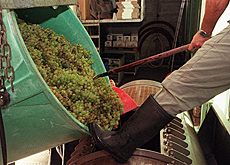Winemakers mount barricades over oak chips

Several Swiss winegrowing regions have banned the use of oak chips to flavour premium wines, overruling a new law enabling them to do so.
They say the practice is alien to the country’s centuries-old winemaking tradition and threatens to undermine the quality of native wines.
On January 1 this year the Swiss government followed the European Union in allowing the addition of wood chips to wine.
The cost-saving practice has been popular in the United States, South America, Australia and South Africa for several years, because it speeds the ageing process and removes the need for long and expensive storage in oak barrels.
But several winegrowing cantons are refusing to play ball and have outlawed oak chips for wines bearing the AOC quality label, which account for three-quarters of Swiss production.
They include Valais, the country’s leading wine region, Geneva, Ticino and Neuchâtel.
“We have no tradition of using these wood chips, which, in addition, bring no added value in terms of image and reputation,” said Pierre-André Roduit, head of the Valais Viticulture Office, which succeeded in getting a ban put in place on July 1.
“Using wood chips is certainly at least ten times cheaper than barrel ageing, but in our eyes the importance of our culture and expertise are more important.”
Vintage
A similar ban is being introduced in canton Geneva but this will apply solely to this year’s vintage. The issue will be re-examined during a revision of the canton’s winemaking legislation in 2008.
Canton Neuchâtel announced on Friday that it too had banned the addition of oak chips to AOC wines, following pressure from local winemakers.
But opposition is far from uniform across the country. Winemakers in canton Vaud, one of the country’s biggest producers, have opted for “unlimited” use of chips.
Gilles Cornut, president of the local winemakers association, said it would be wrong to call for a ban when there were no means of enforcing it. He added that market forces and foreign competition also needed to be taken into account.
Premium wines
The Federal Health Office, which introduced the new legislation, said local authorities that banned oak chips for premium wines were not breaking the law, as they were entitled to set their own criteria for AOC certification.
Under the legislation, winemakers that use oak chips are not allowed to label their wines “aged in oak barrels”. But they do not have to stipulate the fact that chips have been used during the winemaking process.
Both the Association of Swiss Winemakers and Cellarmen and the Consumers Association have warned that this could lead to confusion among customers.
Claude Bocquet-Thonney, president of the Association of Swiss Winemakers and Cellarmen, told swissinfo that her members would continue to push for a change on labelling, saying consumers were being “tricked”.
swissinfo, Adam Beaumont with agencies
Wine consumption in Switzerland has been steadily falling.
In 2006 the Swiss consumed 270.2 million litres of wine.
The amount in 2005 was 272.9 million litres.
In 2004 it was 282.4 million litres.
According to the Federal Agriculture Office, wine consumption fell last year in Switzerland to 270 million litres – 2.5% less than in 2005. Swiss wine accounted for just over 100 million litres, of which slightly more than half was red wine.
Last year’s grape harvest, which was described by officials as “weak”, was only 1% up on the previous year.
Valais is the main wine-producing region of Switzerland with vines covering 5,136 hectares. Vaud is in second place with grapes over 3,851 hectares, followed by Geneva with 1,288 hectares.
Wine is also produced to a lesser extent in Ticino (1,036 hectares), around Zurich (619), Neuchâtel (596) and Schaffhausen (472).

In compliance with the JTI standards
More: SWI swissinfo.ch certified by the Journalism Trust Initiative










You can find an overview of ongoing debates with our journalists here . Please join us!
If you want to start a conversation about a topic raised in this article or want to report factual errors, email us at english@swissinfo.ch.